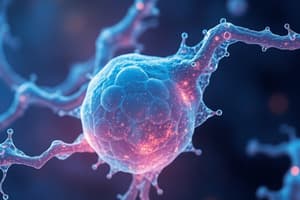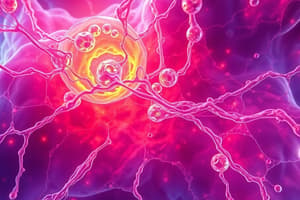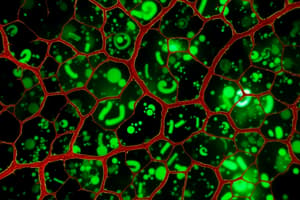Podcast
Questions and Answers
What is cutis laxa primarily caused by?
What is cutis laxa primarily caused by?
- Mutations in genes leading to issues with elastin (correct)
- Defective proteoglycans in the extracellular matrix
- Physical trauma to the skin resulting in fibrosis
- Excessive levels of MMPs in the skin
What role do proteoglycans play in the extracellular matrix?
What role do proteoglycans play in the extracellular matrix?
- They degrade ECM components during wound healing.
- They provide structural rigidity to the plasma membrane.
- They bind water molecules and form a hydrated gel. (correct)
- They facilitate cell adhesion through glycoprotein interactions.
What characterizes the structure of laminin?
What characterizes the structure of laminin?
- It is involved exclusively in signaling pathways without physical structure.
- It is made of three different polypeptide chains linked by disulfide bonds. (correct)
- It consists of multiple glycosaminoglycan chains.
- It forms a linear array of fibronectin domains.
What are matrix metalloproteinases (MMPs) primarily responsible for?
What are matrix metalloproteinases (MMPs) primarily responsible for?
How do GAGs contribute to the properties of proteoglycans?
How do GAGs contribute to the properties of proteoglycans?
What is the role of integrins in cellular interactions?
What is the role of integrins in cellular interactions?
Which of the following is NOT a function of cell interactions?
Which of the following is NOT a function of cell interactions?
What characteristic distinguishes integrins from other receptors on the cell surface?
What characteristic distinguishes integrins from other receptors on the cell surface?
During which developmental process is the organization of tissues and organs primarily determined?
During which developmental process is the organization of tissues and organs primarily determined?
How do integrins function in terms of ligand binding?
How do integrins function in terms of ligand binding?
What is the 'Velcro principle' in the context of integrins?
What is the 'Velcro principle' in the context of integrins?
Which type of interactions are regulated by cell-cell and cell-environment mechanisms?
Which type of interactions are regulated by cell-cell and cell-environment mechanisms?
What determines the ligand specificity for cell-ECM adhesion in integrins?
What determines the ligand specificity for cell-ECM adhesion in integrins?
How many known binding pairs of integrin heterodimers are there in humans?
How many known binding pairs of integrin heterodimers are there in humans?
Which of the following is involved in inside-out signaling for integrins?
Which of the following is involved in inside-out signaling for integrins?
What is the primary effect of outside-in signaling through integrins?
What is the primary effect of outside-in signaling through integrins?
Which subunit of integrins is associated with mechanotransduction events?
Which subunit of integrins is associated with mechanotransduction events?
What triggers integrin activation during inside-out signaling?
What triggers integrin activation during inside-out signaling?
What role do growth factor receptors have in relation to integrins?
What role do growth factor receptors have in relation to integrins?
Which of the following represents the composition of integrins?
Which of the following represents the composition of integrins?
What process is affected by the recruitment of talin to the β-integrin cytoplasmic tail?
What process is affected by the recruitment of talin to the β-integrin cytoplasmic tail?
How many α and β subtypes of integrins are found in humans?
How many α and β subtypes of integrins are found in humans?
What is the primary function of glycocalyx?
What is the primary function of glycocalyx?
Which class of proteins is NOT a component of the extracellular matrix?
Which class of proteins is NOT a component of the extracellular matrix?
Which statement about collagen is true?
Which statement about collagen is true?
How many different types of collagens exist?
How many different types of collagens exist?
What is a characteristic of structural proteins in the ECM?
What is a characteristic of structural proteins in the ECM?
Which of the following describes the composition of the extracellular matrix (ECM)?
Which of the following describes the composition of the extracellular matrix (ECM)?
What specific role does the ECM play in tissue homeostasis?
What specific role does the ECM play in tissue homeostasis?
Which of the following is NOT a property of glycoproteins in the glycocalyx?
Which of the following is NOT a property of glycoproteins in the glycocalyx?
What type of structure do collagen fibers exhibit?
What type of structure do collagen fibers exhibit?
What is the primary role of adhesive glycoproteins in the ECM?
What is the primary role of adhesive glycoproteins in the ECM?
What role does proline hydroxylation play in collagen synthesis?
What role does proline hydroxylation play in collagen synthesis?
What condition is associated with a deficiency of vitamin C?
What condition is associated with a deficiency of vitamin C?
Which collagen types are implicated in Osteogenesis imperfecta?
Which collagen types are implicated in Osteogenesis imperfecta?
What characterizes the structural properties of elastin?
What characterizes the structural properties of elastin?
How does Ehlers-Danlos disease arise?
How does Ehlers-Danlos disease arise?
What is the primary function of hydroxylysine in collagen?
What is the primary function of hydroxylysine in collagen?
What is the half-life of elastin in healthy tissues?
What is the half-life of elastin in healthy tissues?
What happens during oxidative deamination of lysine and hydroxylysine in collagen?
What happens during oxidative deamination of lysine and hydroxylysine in collagen?
What is required for the synthesis of elastin during adult life?
What is required for the synthesis of elastin during adult life?
What effect does failure to hydroxylate proline and lysine residues have on collagen?
What effect does failure to hydroxylate proline and lysine residues have on collagen?
Flashcards
Cell-Cell and Cell-Environment Mechanical Interactions
Cell-Cell and Cell-Environment Mechanical Interactions
Interactions that occur between cells and their surrounding environment, playing a crucial role in processes such as cell movement, growth, and differentiation.
Extracellular Matrix (ECM)
Extracellular Matrix (ECM)
The complex network of molecules outside of cells that provides structural support, organization, and communication within tissues.
Integrins
Integrins
Transmembrane receptors found on the surface of animal cells that mediate adhesion between cells and the extracellular matrix.
Lower Affinity Binding of Integrins
Lower Affinity Binding of Integrins
Signup and view all the flashcards
High Concentration of Integrins
High Concentration of Integrins
Signup and view all the flashcards
Velcro Principle
Velcro Principle
Signup and view all the flashcards
Cell Migration
Cell Migration
Signup and view all the flashcards
Tissue and Organ Organization
Tissue and Organ Organization
Signup and view all the flashcards
What is Cutis Laxa?
What is Cutis Laxa?
Signup and view all the flashcards
Describe Proteoglycans.
Describe Proteoglycans.
Signup and view all the flashcards
What are Adhesive Glycoproteins?
What are Adhesive Glycoproteins?
Signup and view all the flashcards
What are Matrix Metalloproteinases (MMPs)?
What are Matrix Metalloproteinases (MMPs)?
Signup and view all the flashcards
How do MMPs contribute to wound healing?
How do MMPs contribute to wound healing?
Signup and view all the flashcards
What are integrins?
What are integrins?
Signup and view all the flashcards
How many different integrins are there in humans?
How many different integrins are there in humans?
Signup and view all the flashcards
What does the α subunit of an integrin do?
What does the α subunit of an integrin do?
Signup and view all the flashcards
What does the β subunit of an integrin do?
What does the β subunit of an integrin do?
Signup and view all the flashcards
What is inside-out signaling?
What is inside-out signaling?
Signup and view all the flashcards
How does talin activate integrins?
How does talin activate integrins?
Signup and view all the flashcards
What is outside-in signaling?
What is outside-in signaling?
Signup and view all the flashcards
What happens when integrins bind to the ECM?
What happens when integrins bind to the ECM?
Signup and view all the flashcards
How do growth factor receptors interact with integrin signaling?
How do growth factor receptors interact with integrin signaling?
Signup and view all the flashcards
Functional complexity of collagen
Functional complexity of collagen
Signup and view all the flashcards
Proline hydroxylation in collagen
Proline hydroxylation in collagen
Signup and view all the flashcards
Glycosylation of collagen
Glycosylation of collagen
Signup and view all the flashcards
Cross-linking in collagen
Cross-linking in collagen
Signup and view all the flashcards
Scurvy and collagen
Scurvy and collagen
Signup and view all the flashcards
Collagen mutations and diseases
Collagen mutations and diseases
Signup and view all the flashcards
Osteogenesis imperfecta
Osteogenesis imperfecta
Signup and view all the flashcards
Ehlers-Danlos syndrome
Ehlers-Danlos syndrome
Signup and view all the flashcards
Elastin: properties and function
Elastin: properties and function
Signup and view all the flashcards
Formation of elastic fibers
Formation of elastic fibers
Signup and view all the flashcards
What is the glycocalix?
What is the glycocalix?
Signup and view all the flashcards
What is the Extracellular matrix (ECM)?
What is the Extracellular matrix (ECM)?
Signup and view all the flashcards
What is a basement membrane?
What is a basement membrane?
Signup and view all the flashcards
What are the major components of the Extracellular matrix (ECM)?
What are the major components of the Extracellular matrix (ECM)?
Signup and view all the flashcards
What are collagens?
What are collagens?
Signup and view all the flashcards
What are collagens?
What are collagens?
Signup and view all the flashcards
What is elastin?
What is elastin?
Signup and view all the flashcards
What are proteoglycans?
What are proteoglycans?
Signup and view all the flashcards
What is type I collagen?
What is type I collagen?
Signup and view all the flashcards
Study Notes
Cell-Extracellular Matrix Interactions
- Cells in multicellular organisms interact physically with each other and the extracellular environment.
- These interactions control diverse cellular activities like migration, growth, and differentiation.
- The interactions also define the 3D organization of tissues developed during embryonic stages.
Cell-Cell and Cell-Environment Interactions
- Specialized cell-cell and cell-substrate contacts are crucial.
- Basement membrane facilitates cell-substratum interaction
- The basement membrane is composed of specialized components like reticular fibers, proteoglycans, collagen fibers, cell surface receptors, fibroblasts, and elastic fibers.
Integrins
- Integrins are transmembrane receptors mediating cell-ECM adhesion.
- These receptors are expressed on plasma membranes of animal cells and bind to components of the extracellular matrix.
- Integrins trigger intracellular signals through the binding of their ligands.
- Integrins exhibit lower affinity and higher concentration compared to other receptors.
Integrin Subtypes and Pairs
- 18 alpha (α) and 8 beta (β) subtypes unite to form 24 known integrin heterodimer pairs in humans.
Integrin Function
- Integrins bind diverse matrix components due to monomer heterogeneity.
- The alpha subunit determines ligand specificity for cell-ECM adhesion.
- The beta subunit regulates subsequent mechanotransduction.
Laminin Receptors, RGD Receptors, Leukocyte-Specific Receptors, and Collagen Receptors
- These receptors bind various matrix molecules.
Integrin-Based Signaling
- Inside-out signaling from inside the cell triggers integrin activation, recruitment of activators like talin, and a conformational transition leading to ligand binding.
- Outside-in signaling through integrin-ECM interactions triggers intracellular signals causing focal adhesion formation and actin cytoskeletal reorganization; this influences downstream cellular activity.
Glycocalyx
- Glycocalyx comprises carbohydrate projections from glycoproteins in plasma membranes (especially in the GI tract).
- It facilitates cell-cell and cell-substrate interactions, protects cells mechanically, and acts as a barrier for molecules approaching the plasma membrane.
- It also binds regulatory factors interacting with the cell surface.
Extracellular Matrix (ECM)
- The ECM is a network of molecules secreted by cells, offering mechanical support, holding cells together, and delivering chemical and physical signals.
- Crucial in stabilizing cell morphology, tissue structure, and homeostasis. This is seen in basement membranes.
ECM Composition
- The extracellular matrix is composed of macromolecules.
- Fibrous proteins (e.g., collagen and elastin) forming a 3D network.
- Protein-carbohydrate complexes (e.g., proteoglycans).
- Adhesive glycoproteins (e.g., fibronectins and laminins).
Structural ECM Proteins (Collagen and Elastin)
- Collagen types are diverse—28 types formed through various polypeptide chain combinations.
- Types I, II, III, V, IV make up most of body collagen.
- Collagen comprises the most abundant protein and provides high tensile strength to extracellular matrix.
- Collagen is produced by fibroblasts, smooth muscle cells, and epithelial cells.
- Collagen structure is trimeric, made up of alpha chains; their arrangement dictates the fiber properties.
- Hydroxylation of proline and lysine residues plays a critical role in collagen fiber stability and solubility.
- Intra and inter-molecular crosslinks reinforce the collagen fibers further.
Collagen Synthesis
- Collagens begin as preprocollagen undergoing modifications in the ER.
- Hydroxylated proline and lysine form hydrogen bonds, promoting triple helix structure and solubility.
- Glycosylation of hydroxylated lysine adds carbohydrate moieties.
- Subsequently, the N- and C-terminal regions are removed; then, cross-linking occurs.
Collagen in Diseases
- Deficiencies in Pro hydroxylation or Vitamin C (needed for hydroxylation) can lead to scurvy, causing impaired tensile strength and tissue integrity.
- Mutations within collagen genes can cause congenital defects in tissue structure and function. This includes osteogenesis imperfecta.
- Genetic defects within COL1A1 or COL1A2 genes cause this.
- Ehlers-Danlos syndrome stems from mutations relating to different collagen genes like COL5A1, COL5A2, COL1A1, and COL3A1
Elastin
- Elastin, an insoluble protein, provides elasticity and resilience to tissues. A key feature involves its extensive crosslinking structure; this allows for gradual degradation, even in healthy tissues with a half-life of about 70 years.
- Elastin production involves tropoelastin monomers linked enzymatically and over microfibrils.
- Genes for elastin are expressed in an embryonic period but not after adolescence.
Elastin in Diseases
- Cutis laxa, a rare congenital disorder, results from elastin abnormalities or reduced levels. It shows variations in severity and tissue-specific manifestations.
Protein-Carbohydrate Complexes of the ECM (Proteoglycans)
- Proteoglycans are protein-carbohydrate complexes abundant in cartilage, bone, and ECM.
- They consist of a protein core with covalently attached GAGs, which are heavily sulfated sugars.
- The presence of both sulfate and carboxyl groups makes GAGs highly acidic.
- Proteoglycans bind water molecules, creating a hydrated gel-like structure within the ECM.
- This structure gives the ECM high resistance against compressive forces.
Adhesive Glycoproteins (Fibronectins and Laminins)
- Fibronectin is a linear peptide array with 30 modular domains.
- They possess cell binding domains (like RGD) for integrin interactions and sites to connect to ECM constituents.
- Laminin, a glycoprotein, is a cross-shaped heterotrimer binding ECM proteins, and plasma membranes.
Matrix Metalloproteinases (MMPs)
- MMPs are zinc-containing enzymes involved in ECM remodeling. During embryonic development, tissue generation, and healing of injury after damage, MMPs help.
- MMPs are often produced in inactive zymogen form to regulate tissue remodeling activity.
MMPs in Wound Healing
- MMPs are significant in cutaneous wound healing. Different MMPs play various roles in different phases of wound healing.
- The timing and abundance of their activation are critical for optimal wound healing. Inflammation, angiogenesis, and remodeling phases involve MMP action.
Studying That Suits You
Use AI to generate personalized quizzes and flashcards to suit your learning preferences.





